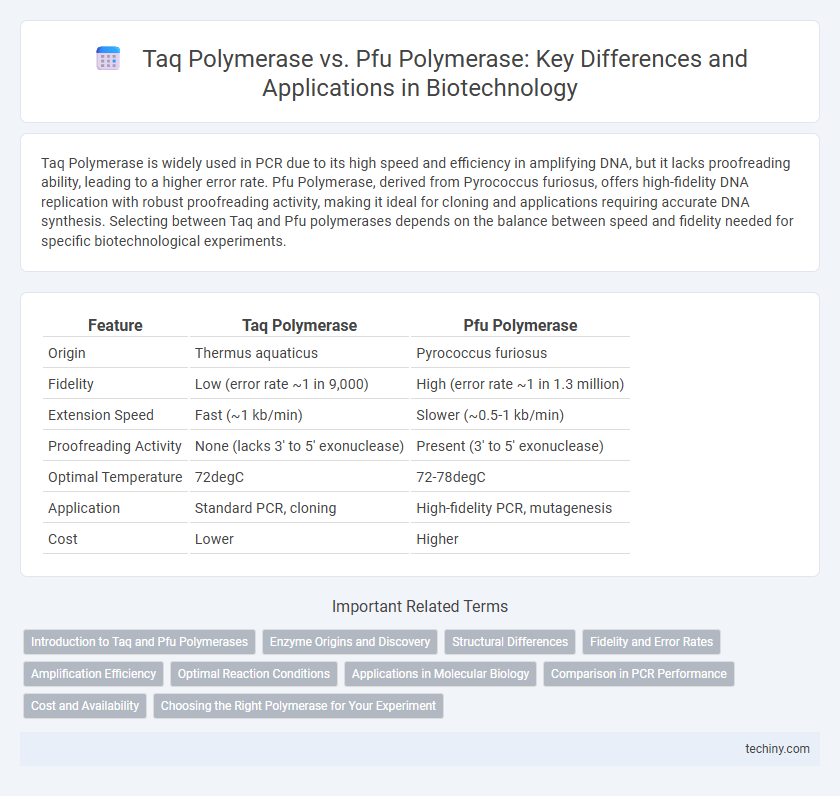Taq Polymerase is widely used in PCR due to its high speed and efficiency in amplifying DNA, but it lacks proofreading ability, leading to a higher error rate. Pfu Polymerase, derived from Pyrococcus furiosus, offers high-fidelity DNA replication with robust proofreading activity, making it ideal for cloning and applications requiring accurate DNA synthesis. Selecting between Taq and Pfu polymerases depends on the balance between speed and fidelity needed for specific biotechnological experiments.
Table of Comparison
| Feature | Taq Polymerase | Pfu Polymerase |
|---|---|---|
| Origin | Thermus aquaticus | Pyrococcus furiosus |
| Fidelity | Low (error rate ~1 in 9,000) | High (error rate ~1 in 1.3 million) |
| Extension Speed | Fast (~1 kb/min) | Slower (~0.5-1 kb/min) |
| Proofreading Activity | None (lacks 3' to 5' exonuclease) | Present (3' to 5' exonuclease) |
| Optimal Temperature | 72degC | 72-78degC |
| Application | Standard PCR, cloning | High-fidelity PCR, mutagenesis |
| Cost | Lower | Higher |
Introduction to Taq and Pfu Polymerases
Taq polymerase is a thermostable enzyme derived from Thermus aquaticus, widely used for its efficient DNA amplification during polymerase chain reaction (PCR) due to its optimal activity at high temperatures. Pfu polymerase, isolated from Pyrococcus furiosus, offers high-fidelity DNA synthesis with proofreading capabilities, reducing errors in PCR products. Both enzymes are integral in molecular biology, with Taq favored for speed and Pfu preferred for accuracy in DNA replication tasks.
Enzyme Origins and Discovery
Taq polymerase, derived from the thermophilic bacterium Thermus aquaticus discovered in the hot springs of Yellowstone National Park in 1969, revolutionized PCR due to its heat stability. Pfu polymerase originates from the hyperthermophilic archaeon Pyrococcus furiosus, identified in submarine thermal vents, with its robust proofreading ability enhancing DNA replication accuracy. These distinct enzyme origins reflect their specialized roles in biotechnology applications requiring high-temperature DNA synthesis.
Structural Differences
Taq polymerase, derived from Thermus aquaticus, features a robust but error-prone structure lacking 3' to 5' exonuclease proofreading activity, resulting in lower fidelity during DNA amplification. In contrast, Pfu polymerase from Pyrococcus furiosus possesses an intricate proofreading domain that enhances its structural stability and high-fidelity DNA synthesis by excising misincorporated nucleotides. These structural differences directly impact their respective applications in PCR, with Taq polymerase favored for speed and Pfu polymerase preferred for accuracy.
Fidelity and Error Rates
Taq polymerase exhibits lower fidelity with an error rate of approximately 1 in 9,000 nucleotides incorporated, often resulting in mutations during DNA amplification. In contrast, Pfu polymerase has a superior proofreading ability due to its 3' to 5' exonuclease activity, reducing error rates to about 1 in 1.3 million nucleotides. The enhanced accuracy of Pfu polymerase makes it preferable for applications requiring high-fidelity DNA replication, such as cloning and sequencing.
Amplification Efficiency
Taq polymerase exhibits faster amplification efficiency due to its high extension rate of approximately 60 nucleotides per second, making it suitable for quick DNA replication in PCR. Pfu polymerase, while slower with an extension rate near 20 nucleotides per second, offers higher fidelity and proofreading capabilities, resulting in fewer replication errors. Choosing between Taq and Pfu polymerase depends on whether speed or accuracy is prioritized for specific biotechnological applications.
Optimal Reaction Conditions
Taq polymerase exhibits optimal activity at 72degC with a buffer containing 1.5 mM MgCl2 and a pH of 8.3, making it suitable for rapid DNA amplification in standard PCR protocols. Pfu polymerase requires slightly higher Mg2+ concentrations, typically around 2 mM, and maintains optimal function at 72-74degC with a pH near 8.8, offering high-fidelity DNA synthesis ideal for cloning applications. Both enzymes perform best under thermal cycling conditions but differ in buffer composition and temperature specificity, impacting yield and fidelity in PCR reactions.
Applications in Molecular Biology
Taq Polymerase is widely used in routine PCR applications due to its high efficiency and rapid DNA synthesis at elevated temperatures, making it ideal for amplifying DNA fragments in cloning and genotyping. Pfu Polymerase offers superior proofreading ability and higher fidelity, which is critical for applications requiring accurate DNA replication, such as site-directed mutagenesis and DNA sequencing. Both enzymes are essential tools in molecular biology, with Taq favored for speed and yield, while Pfu is preferred for precision and minimizing errors in sensitive experiments.
Comparison in PCR Performance
Taq polymerase exhibits rapid DNA synthesis with an extension rate of approximately 60 nucleotides per second but lacks 3' to 5' exonuclease proofreading activity, resulting in higher error rates around 1 x 10^-4 to 2 x 10^-5 errors per nucleotide incorporated during PCR. Pfu polymerase, derived from Pyrococcus furiosus, features 3' to 5' exonuclease proofreading activity, significantly enhancing fidelity with error rates near 1.3 x 10^-6, though it synthesizes DNA more slowly than Taq. PCR performance comparison highlights Taq's suitability for applications prioritizing speed and yield, while Pfu is preferred for amplifications requiring high-fidelity DNA replication.
Cost and Availability
Taq polymerase offers a lower-cost solution for DNA amplification, making it widely accessible for routine PCR applications, while Pfu polymerase is typically more expensive due to its high-fidelity proofreading capabilities. The broader commercial availability of Taq polymerase contributes to its popularity in standard laboratory settings, whereas Pfu polymerase is often reserved for applications demanding greater accuracy despite limited supply. Cost considerations and availability impact the choice between these enzymes based on experimental requirements and budget constraints.
Choosing the Right Polymerase for Your Experiment
Taq polymerase offers high-speed DNA amplification ideal for routine PCR applications requiring rapid results, while Pfu polymerase provides superior fidelity with 3' to 5' exonuclease proofreading activity, minimizing errors in sequence replication. Selecting the right enzyme depends on the experiment's priority for speed versus accuracy, such as Taq polymerase for fast amplification of large DNA fragments and Pfu polymerase for cloning or mutagenesis where precision is critical. Consider experiment conditions including template complexity and downstream application to optimize polymerase choice for reliable and efficient DNA synthesis.
Taq Polymerase vs Pfu Polymerase Infographic

 techiny.com
techiny.com